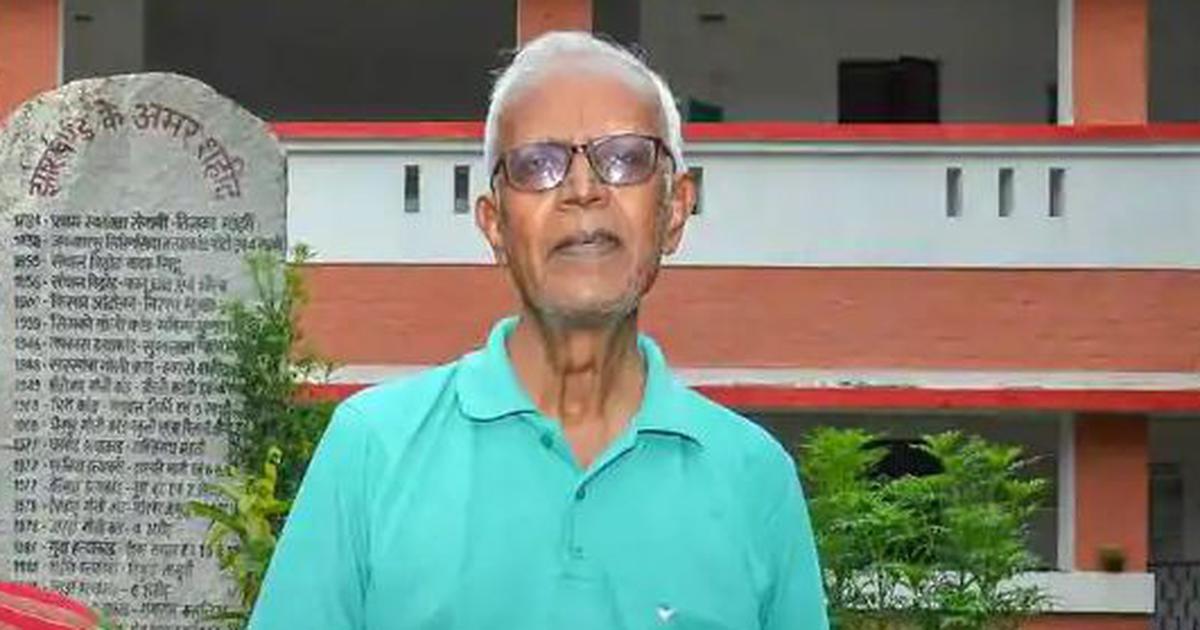
Tribal rights activist Stan Swamy, arrested in Elgaar Parishad case, dies
Bhima Koregaon-accused Stan Swamy died on Monday at 84; he had suffered from post COVID complications and been on ventilator support since Sunday

Jesuit priest Stan Swamy, an 84-year-old tribal rights activist who had been arrested in the Elgaar Parishad case last year, passed away on Monday. He had contracted COVID while in prison.
Swamy had been on ventilator as his health deteriorated early Sunday. His lawyers had moved the Bombay High Court on Monday morning, seeking an urgent hearing for a medical bail plea.
In one of his last messages, Swamy said: “What is happening to me is not something unique, happening to me alone. It is a broader process that is taking place all over the country. We are all aware how prominent intellectuals, lawyers, writers, poets, activists, student leaders – they are all put in jail just because they have expressed their dissent…I am ready to pay the price whatever may it be.”
Medical attention
The tribal rights activist was admitted to the private hospital on May 29 from the Taloja prison following the HC’s order on a petition filed by him, seeking medical attention as he was then suffering from COVID-19 and Parkinson’s disease.
Dr Ian DSouza, director of the Holy Family Hospital in suburban Bandra, told the court that Swamy suffered a cardiac arrest early Sunday morning following which he was put on ventilator support. He (Swamy) did not recover and passed away this afternoon, the official told the court. The cause of the death is pulmonary infection, Parkinson’s disease and post-COVID complications, he said.
Also read: NIA disputes US firm’s report in Rona Wilson-Elgar Parishad case
Swamy’s counsel Mihir Desai said there was negligence on part of the Taloja prison authorities, who failed to provide immediate medical attention to the Jesuit priest. Swamy was arrested by the National Investigation Agency (NIA) in October 2020 and had been in jail since then.
Swamy had been in jail for nine months over alleged links to the Bhima Koregaon case. He was charged under various sections of the Indian Penal Code and terror-related offences of Unlawful Activities (Prevention) Act.
The National Investigation Agency (NIA) had charged him with helping the cause of the Communist Party of India (Maoist), a banned outfit, through various civil rights organisations he worked with.
In May, Swamy had tested positive for COVID after being shifted to a hospital, which was done on the Bombay High Court’s orders. On June 17, as his health deteriorated, the court ruled that he should stay in the hospital till July 5.
Civil society groups, citing his health concerns, have repeatedly called for Swamy’s release from jail.
‘Caged bird can still sing’
From jail, Swamy had said: “Dear friends, thank you so much for the solidarity support by so many, for me and my co-accused. I am really grateful…My needs are limited. The Adivasis and the Society of Jesus (his congregation) have taught me to lead a simple life… Listening to the life narratives of the poor prisoners is my joy in Taloja Jail… I see God in their pains and smiles…
“Many of such poor undertrials don’t know what charges have been put on them, have not seen their chargesheet and just remain for years without any legal or other assistance. The 16 co-accused have not been able to meet each other as we are lodged in different jails or different ‘circles’ within the same jail. But we will still sing in chorus. A caged bird can still sing.”
A life devoted to Adivasis
Swamy or `Stan as his friends called him had spent long years working among his beloved Advisasis in this eastern Indian tribal state.
In 2016, moved by the plight of Adivasi prisoners in the tribal state, many of whom were falsely branded as Naxalites, Swamy did a research on them which was published as a report titled Deprived of rights over natural resources, impoverished Adivasis get prison: a study of Undertrials in Jharkhand.
His study found that 31 per cent of undertrials and a little over a third of the convicts were tribals. The percentage of tribals in jail was far higher than their proportion of the population. Among other key findings were that 97 per cent of undertrials interviewed said that allegations that they were linked to Maoists were false, and 96 per cent of them earned less than Rs 5,000 a month, underlining the fact the poorest and the most vulnerable in the state were the among the ones arrested under stringent anti-terror laws.
His study coming after three decades of work among the tribals which focussed on their community, land and forest rights, was considered authoritative but also discomfited the powers that be.
Swamy, who was born in Trichy in Tamil Nadu, according to his friends, studied theology and did a Masters in Sociology at the University of Manila in the 1970s.
Later he studied at Brussels where he struck up a friendship with Archbishop Holder Camara whose work among Brazils poor influenced him.
He later worked as Director of the Jesuit-run Indian Social Institute at Bangalore from 1975 to 1986.
As an activist for tribals in Jharkhand some thirty years ago, he worked for the release of tribal youths from imprisonment, often in cases where they were falsely accused.


